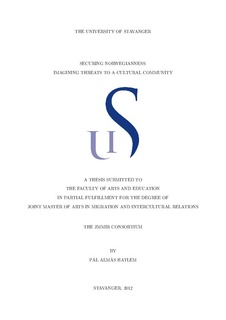| dc.description.abstract | This Master's thesis is born out of a growing unease with the general discourse on immigration and immigration policy in Norway. What at times appears as an ongoing discussion concerning the amount, and potential negative impact, of immigrants, asylum seekers and refugees that should or should not be admitted into Norway, has become an overarching container for a plethora of important discussions on the underlying issues of globalization, the Norwegian welfare state, secularism and religion, cultural identity, ethnicity, citizenship and, central to this thesis; what it entails to be Norwegian. Whereas a Norwegian identity may or may not exist as a unique conglomerate that is, as particular to Norwegians consisting of a range of cultural, ethnic and political idiosyncrasies, it is never the less present a posteriori, vocally defended when viewed as a target being threatened by external pressure. This external threat, it seems when looking into the Norwegian public debate, is primarily constituted by `foreign-culturals', that is, migrants from beyond the Western cultural community, none more foreign than Muslims. Originating from a range of more or less vocal actors across the Norwegian political spectrum, cries for support in defending Norwegian values and culture is mediated through newspapers, television and radio on a daily basis, creating an environment where the baser instincts of homo Norvegicus are allowed to thrive and flourish.
Norwegianness, in the vast majority of its subscribers, is neither problematized nor properly conceptualized until it meets this foreign `constitutive outside', forcing into play a renewed interest in what it means to be Norwegian. The value-oriented tenets of Norwegianness, however, are at times indistinguishable from the core ideas of the more classic conceptions of European enlightenment. The Enlightenment, both as historical epoch as well as ongoing civilizing project (in its multiple understandings and facets), is fundamental as a backdrop in the construction of a binary opposition between the rational and agency-driven (while emphatically good-hearted) `Us' as opposed to the cultural-psychologically driven, abject, immigrant `Other'. | no_NO |
